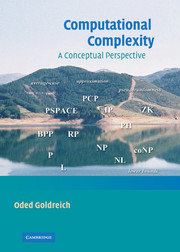Book contents
- Frontmatter
- Contents
- List of Figures
- Preface
- Organization and Chapter Summaries
- Acknowledgments
- 1 Introduction and Preliminaries
- 2 P, NP, and NP-Completeness
- 3 Variations on P and NP
- 4 More Resources, More Power?
- 5 Space Complexity
- 6 Randomness and Counting
- 7 The Bright Side of Hardness
- 8 Pseudorandom Generators
- 9 Probabilistic Proof Systems
- 10 Relaxing the Requirements
- Epilogue
- Appendix A Glossary of Complexity Classes
- Appendix B On the Quest for Lower Bounds
- Appendix C On the Foundations of Modern Cryptography
- Appendix D Probabilistic Preliminaries and Advanced Topics in Randomization
- Appendix E Explicit Constructions
- Appendix F Some Omitted Proofs
- Appendix G Some Computational Problems
- Bibliography
- Index
Appendix D - Probabilistic Preliminaries and Advanced Topics in Randomization
Published online by Cambridge University Press: 05 June 2012
- Frontmatter
- Contents
- List of Figures
- Preface
- Organization and Chapter Summaries
- Acknowledgments
- 1 Introduction and Preliminaries
- 2 P, NP, and NP-Completeness
- 3 Variations on P and NP
- 4 More Resources, More Power?
- 5 Space Complexity
- 6 Randomness and Counting
- 7 The Bright Side of Hardness
- 8 Pseudorandom Generators
- 9 Probabilistic Proof Systems
- 10 Relaxing the Requirements
- Epilogue
- Appendix A Glossary of Complexity Classes
- Appendix B On the Quest for Lower Bounds
- Appendix C On the Foundations of Modern Cryptography
- Appendix D Probabilistic Preliminaries and Advanced Topics in Randomization
- Appendix E Explicit Constructions
- Appendix F Some Omitted Proofs
- Appendix G Some Computational Problems
- Bibliography
- Index
Summary
What is this? Chicken Curry and Seafood Salad? Fine, but in the same plate? This is disgusting!
Johan Håstad at Grendel's, Cambridge (1985)Summary: This appendix lumps together some preliminaries regarding probability theory and some advanced topics related to the role and use of randomness in computation. Needless to say, each of these topics appears in a separate section.
The probabilistic preliminaries include our conventions regarding random variables, which are used throughout the book. Also included are overviews of three useful probabilistic inequalities: Markov's Inequality, Chebyshev's Inequality, and the Chernoff Bound.
The advanced topics include hashing, sampling, and randomness extraction. For hashing, we describe constructions of pairwise (and t-wise independent) hashing functions and (a few variants of) the Leftover Hashing Lemma (used a few times in the main text). We then review the “complexity of sampling”: that is, the number of samples and the randomness complexity involved in estimating the average value of an arbitrary function defined over a huge domain. Finally, we provide an overview on the question of extracting almost-perfect randomness from sources of weak (or defected) randomness.
Probabilistic Preliminaries
Probability plays a central role in Complexity Theory (see, for example, Chapters 6–10). We assume that the reader is familiar with the basic notions of probability theory. In this section, we merely present the probabilistic notations that are used throughout the book and three useful probabilistic inequalities.
- Type
- Chapter
- Information
- Computational ComplexityA Conceptual Perspective, pp. 523 - 544Publisher: Cambridge University PressPrint publication year: 2008



